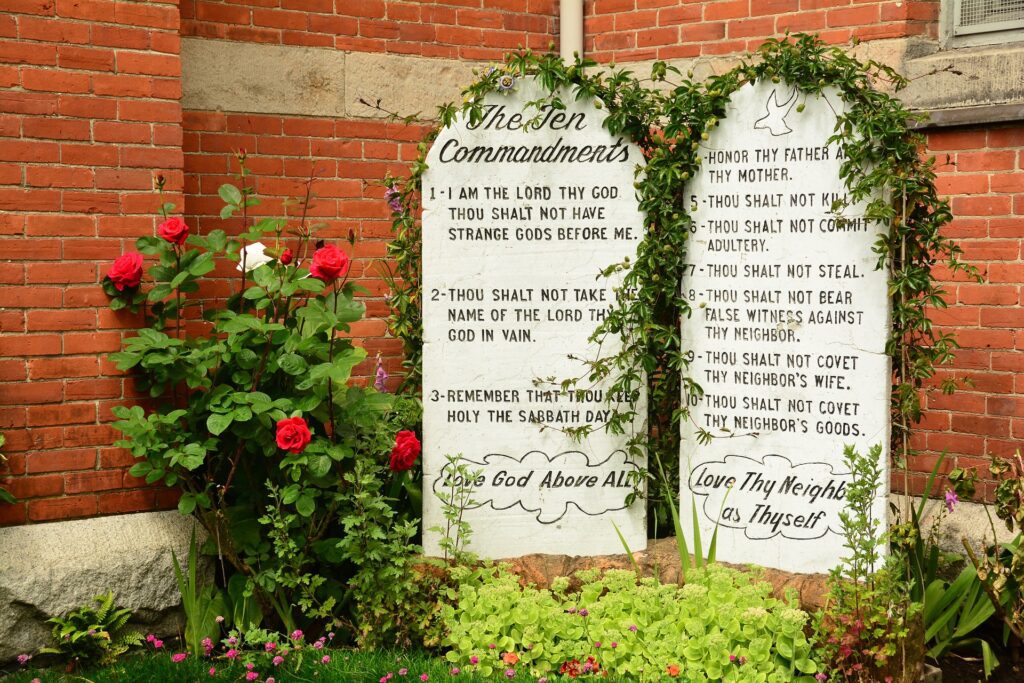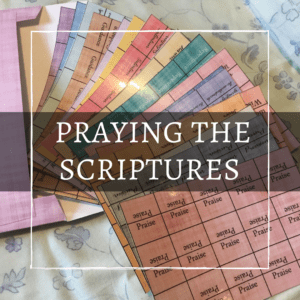I’m not sure where this idea originated, but it has been around so long that we really need to take the time to logically think it through. Are the concepts of Torah and grace incongruent? Can they coexist? Let’s take a look at this idea from a few different angles.

Yeshua came to fulfill Torah
If I had a nickel for every time someone said that we don’t have to keep Torah because Christ fulfilled it…
Do not think that I came to abolish the Torah or the Prophets! I did not come to abolish, but to fulfill. Amen, I tell you, until heaven and earth pass away, not the smallest letter or serif shall ever pass away from the Torah until all things come to pass.
Matthew 5:17-18 TLV
Let’s define some terms.
abolish:
Strong’s concordance
kataluō
kat-al-oo’-o
From G2596 and G3089; to loosen down (disintegrate), that is, (by implication) to demolish (literally or figuratively); specifically (compare G2646) to halt for the night: – destroy, dissolve, be guest, lodge, come to nought, overthrow, throw down.
fulfill:
Strong’s concordance
plēroō
play-ro’-o
From G4134; to make replete, that is, (literally) to cram (a net), level up (a hollow), or (figuratively) to furnish (or imbue, diffuse, influence), satisfy, execute (an office), finish (a period or task), verify (or coincide with a prediction), etc.: – accomplish, X after, (be) complete, end, expire, fill (up), fulfil, (be, make) full (come), fully preach, perfect, supply.
To abolish or destroy means to get rid of entirely. Was the law completely destroyed? Was it thrown down? If that is truly the case, then murder, lying, stealing, adultery, beastiality, greed, and many other crimes are now acceptable. The law defined right and wrong for us. If the law was removed, we no longer have a definition of right and wrong. The obvious conclusion is that we can do what feels right at the moment.
Yeshua very clearly stated that He did not come to abolish the law. That would have been disastrous. Why would He take an established code of conduct and throw it in the trash? The answer is, of course, that He did not.
The word fulfill gives us the concept of filling something up with meaning, taking it to the logical conclusion, explaining it to the fullest extent. That is exactly what Yeshua did through His teachings and His life. He lived out the commands perfectly to show us how to do it. He explained the meaning of the commands, and the heart and intent we should have when following the commands. Let me add, to finish a task does not nullify the task. When our children complete their 12 year education, thus fulfilling their educational requirements to obtain a diploma, they do not then throw it away. We celebrate it. We refer to it when pursuing jobs, further education, and other pursuits. Yeshua fulfilled the demands for punishment, allowing us to acquire salvation through His sacrifice. He did not then throw away the law that He just finished fulfilling.
These verses also bring up a couple other obvious points. Torah does have an expiration date. When heaven and earth pass away, Torah will go with them. Do you still have earth under your feet? Do you still see the heavens above you? Then Torah has not passed away.
Therefore, whoever breaks one of the least of these commandments, and teaches others the same, shall be called least in the kingdom of heaven. But whoever keeps and teaches them, this one shall be called great in the kingdom of heaven. For I tell you that unless your righteousness exceeds that of the Pharisees and Torah scholars, you shall never enter the kingdom of heaven!
Matthew 5:19-20 TLV
The above verses make it quite clear that we are responsible to keep the commands and teach others to do the same.
“See! You are trying to say that we have to keep Torah to be saved!”
No, these verses are saying the exact opposite. Let’s take a look.
First, those who teach others or don’t teach others the commands are still listed as part of the kingdom of heaven. Salvation is assumed for the audience when making these statements. It is assumed that they already have come to YHVH by faith and with a repentant heart. We, as believers, are expected to keep and teach the commands.
Second, Yeshua states that we can’t enter the kingdom unless our righteousness exceeds the Pharisees and scholars. Is that saying that we have to keep the law perfectly to be saved? The Pharisees and scholars studied every jot and tittle of the law, and created ritualistic lives to make sure they didn’t miss anything, yet they were not promised the kingdom as a result. The point Yeshua is making here is that we can’t keep Torah perfectly enough to earn our way into the kingdom. We have to come through Him, repenting and turning from our sin, and accepting His payment on our behalf. Torah shows us our need for salvation. It does not provide salvation. Only Yeshua can do that.
So, if keeping Torah doesn’t save us, why would we even try to obey?
House rules
Throughout Scripture, the kingdom of God is referred to as entering YHVH’s family. The Hebrews were referred to as the “Children of Israel.” YHVH is called our Father. Paul, Shaul, describes salvation as being adopted into YHVH’s family.

When a child is adopted into a family, they are expected to follow the same rules as everyone else in the house. If everyone is expected to make their bed and refrain from jumping on the couch, the adopted child would be expected to do the same. Does making their bed each day earn them the right to be adopted into the family? No, they make their bed because they are already part of the family.
When we come to Yeshua for salvation, we enter the family of God. We are then expected to obey the “house rules.” Guess what those rules are? You got it. Torah.
- The first five books of the Bible lay the groundwork for helping us understand the rules.
- The history books in Scripture give us examples of people who either obeyed or disobeyed.
- The writings, like Psalms, help us to understand the emotions, the struggles, and the delight in obedience.
- The gospels give us Yeshua’s perfect example and extensive explanations of keeping Torah.
- The letters help us to understand keeping Torah in different cultures, and the dangers we can face when Scripture is misunderstood.
All of Scripture helps us to understand how to behave when we are part of YHVH’s family. We are blessed to be part of His family, since we don’t deserve such a privilege, and it is our honor and delight to do as He says.
We try to obey Torah, not to be saved, but because we are saved.
Mortgage or criminal charges?
I had a conversation once with someone about Torah and grace. They slung an argument at me that seemed legit at first, until I realized it was the wrong analogy. Here’s what was said (summarized).
If you have a mortgage on your house, and someone comes along and pays it all off for you, you wouldn’t then continue making payments. You are free and clear. That’s why we don’t keep the law. It’s like making payments on a house that’s already paid off.
Okay, points for trying, but this logic doesn’t work. The condition of my soul is not akin to a mortgage. What we are actually dealing with is criminal charges in a court. I am guilty of breaking the law (defined in Torah, clarified throughout Scripture) and deserve the punishment (hell). Someone (Yeshua) comes forward and takes my punishment for me, thus fulfilling the demands of the law. I am given a full pardon. Do I then walk out of the courthouse and break the law because I was forgiven for breaking the law? Of course not! That doesn’t make any sense at all! We don’t get forgiven for our sin, for breaking the law, only to commence breaking the law!

Two sides of a coin
Torah and grace are not in competition with each other. They are not exclusive ideas. They are two sides of the same coin. Torah helps us to see our sin and our need for a Savior. Grace brings forgiveness and an inner desire to obey the One Who saved us.
Trying to keep Torah alone does nothing for our souls and usually results in pride.
Depending on grace to guide us, while we ignore the rules already laid out, results in us defining our own moral code. We decide what is right and wrong based on our very shallow understanding of love for our fellow man.
We need both Torah and grace to live as true believers in the kingdom.















4 Responses
Well expressed, Heidi. I remember our conversation of a few years ago when you answered my questions along that line. The reason I had asked is that I’d heard it said (wrongly, I was sure!) that “people in the Hebrew Roots movement are not saved; they are trusting in their works for salvation and not in the shed blood of jesus christ.”
I defended your position. I knew then (and still do) that statement is not true. Thank you for educating people on this.
I don’t understand how christians would criticize . . . and not see the reality that grace and faith . . . salvation and torah living . . . those can all be melded to a valid form of worship for a beautiful and god-honoring mix. .
Thank you Linda! It is unfortunate that this misunderstanding is still flying around. I love my Messiah as much as I ever did.
And that is evident. I appreciate your work — and your love and and service for the LorD. I read almost everything you write! 🙂
Sorry for the lack of proper capitalization. The site automatically capitalized everything, so I thought that was covered, lol!